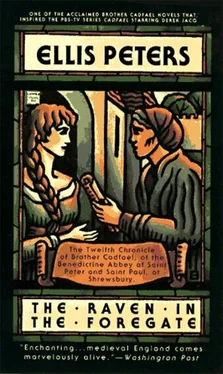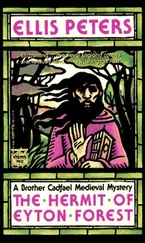Three paces more, and he found what he was seeking. Barely visible through the fringe of rotting ice and the protruding ends of grass, only its tip emerging, Ailnoth’s staff lay at his feet. He took it gingerly by its tapered end, and plucked it out of the water. No mistaking it, once found, there could hardly be two exactly alike. Black and long, with a metal-shod tip and a grooved horn handle, banded to the shaft by a worn silver band embossed in some pattern worn very smooth with age. Whether flying out of the victim’s hand or thrown in afterwards, it must have fallen into the water on this side of the current’s main flow, and so been cast up here into the encroaching border of grass.
Melting snow dripped from the handle and ran down the shaft. Carrying it by the middle of the shaft, Cadfael turned back on his tracks, and circled the reedy shallows back to the mill. He was not yet ready to share his prize with anyone, not even Hugh, until he had had a close look at it, and extracted from it whatever it had to tell him. His hopes were not high, but he could not afford to let any hint slip through his fingers. He hurried through the wicket in the precinct wall, and across the great court, and went to earth in his own workshop. He left the door open for the sake of light, but also lit a wooden spill at the brazier and kindled his little lamp to make a close examination of the trophy.
The hand-long piece of horn, pale brown furrowed with wavy ruts of darker brown, was heavy and polished from years of use, and its slight curve fitted well into the hand. The band of silver was a thumb joint wide, and the half-eroded vine leaves with which it was engraved reflected the yellow light of the lamp from worn highlights as Cadfael carefully dabbed off the moisture and held it close to the flame. The silver had worn thin as gauze, and grown so pliant to every touch that both rims had frayed up into rough edges here and there, sharp as knife blades. Cadfael had scratched a finger in drying the metal before he realised the danger.
This was the formidable weapon with which Father Ailnoth had lashed out at the vexatious urchins who played games against the wall of his house, and no doubt prodded the ribs or thumped the shoulders of the unlucky pupils who were less than perfect in their lessons. Cadfael turned it slowly in his hands in the close light of the lamp, and shook his head over the sins of the virtuous. It was while he was so turning it that his eye was caught by the brief, passing gleam of a drop of moisture, spinning past an inch or more from the rim of silver. Hastily he checked, and turned the staff counterwise, and the bead of brightness reappeared. A single minute drop, clinging not to the metal, but to a fine thread held by the metal, something that appeared and vanished in a silvery curve. He uncoiled on his finger-end a long, greying hair, drawing it forth until it resisted, caught in a sharp edge of silver. Not one hair only, for now a second was partly drawn forth with it, and a third made a small, tight ring, stuck fast in the same tiny nick.
It took him some little time to detach them all from the notch in the lower rim of the band, five of them in all, as well as a few tangled ends. The five were all of fine hair, some brown, some greying to silver, and long, too long for any tonsure, too long for a man, unless he wore his hair neglected and untrimmed. If there had ever been any further mark, of blood, or grazed skin, or thread from a cloth, the water had soaked it away, but these hairs, caught fast in the worn metal, had held their place, to give up their testimony at last.
Cadfael ran a careful hand up the shaft of the staff, and felt the needle-stabs of three or four rough points in the silver. In the deepest of these five precious hairs had been dragged by violence from a head. A woman’s head!
Diota opened the door to him, and on recognising her visitor seemed to hesitate whether to open it wider and step aside to let him in, or hold her ground and discourage any lengthy conversation by keeping him on the doorstep. Her face was guarded and still, and her greeting resigned rather than welcoming. But the hesitation was only momentary. Submissively she stepped back into the room, and Cadfael followed her within and closed the door upon the world. It was early afternoon, the light as good as it would be this day, and the fire in the clay hearth bright and clear, almost without smoke.
“Mistress Hammet,” said Cadfael, with no more than a yard of dim warm air between their faces, “I must talk with you, and what I have to say concerns also the welfare of Ninian Bachiler, whom I know you value. I am in his confidence, if that helps me to yours. Now sit, and listen to me, and believe in my goodwill, as you have nothing on your conscience but the heart’s affection. Which God saw clearly, before ever I held a key to it.”
She turned from him abruptly, but with a suggestion rather of balance and resolution than shock and dread, and sat down on the bench where Sanan had been sitting on his former visit. She sat erect, drawn up with elbows tight at her sides and feet firmly planted.
“Do you know where he is?” she asked in a low voice.
“I do not, though he made to tell me. Rest easy, I talked with him only last night, I know he is well. What I have to say has to do with you, and with what happened on the eve of the Nativity, when Father Ailnoth died, and you… had a fall on the ice.”
She was already certain that he had knowledge she had hoped to keep from the light, but she did not know what it was. She kept silence, her eyes lifted steadily to his face, and left it to him to continue.
“A fall—yes! You won’t have forgotten. You fell on the icy road and struck your head on the doorstone. I dressed the wound then, I saw it again yesterday, and it has healed over, but it still shows the bruise, and the scar where the skin was broken. Now hear what I have found this morning, in the mill-pond. Father Ailnoth’s staff, drifted across to the far shore, and caught in the worn silver band, where the thin edges have turned, and are rough and sharp, five long hairs, the like of yours. Yours I saw closely, when I bathed your wound, I know there were broken ends there. I have the means to match them now.”
She had sunk her head into her hands, the long, work-worn fingers clutched cheek and temple hard.
“Why should you hide your face?” he said temperately. “That was not your sin.”
In a little while she raised a tearless face, blanched and wary, and peered at him steadily between her supporting hands. “I was here,” she said slowly, “when the nobleman came. I knew him again, I knew why he was here. Why else should he come?”
“Why, indeed! And when he was gone, the priest turned upon you. Reviled you, perhaps cursed you, for an accomplice in treason, for a liar and deceiver… We have learned to know him well enough to know that he would not be merciful, nor listen to excuse or pleading. Did he threaten you? Tell you how he would crush your nurseling first, and discard you with ignominy afterwards?”
Her back stiffened. She said with dignity: “I nursed my lamb at this breast after my own child was born dead. He had a sickly mother, poor sweet lady. When he came to me, it was as if a son of my own had come home in need. Do you think I cared what he—my master—might do against me?”
“No, I believe you,” said Cadfael. “Your thought was all of Ninian when you went out after Father Ailnoth that night, to try to turn him from his purpose of challenge and betrayal. For you did follow him, did you not? You must have followed him. How else have I teased your hairs out of the worn band of his staff? You followed and pleaded with him, and he struck you. Clubbed his staff and struck out at your head.”
“I clung to him,” she said, with stony calm now, “fell on my knees in the frosty grass there by the mill, and clung to the skirts of his gown to hold him, and would not let go. I prayed him, I pleaded, I begged him for mercy, but he had none. Yes, he struck me. He could not endure to be so held and crossed, it enraged him, he might well have killed me. Or so I dreaded then. I tried to fend off his blows, but I knew he would strike again if he could not rid himself of me. So I loosed hold and got to my feet, God knows how, and ran from him. And that was the last I ever saw of him living.”
Читать дальше












